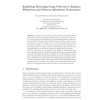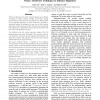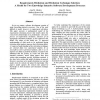419 search results - page 2 / 84 » Two Techniques to Enhance the Performance of Memory Consiste... |
CAV
2010
Springer
13 years 8 months ago
2010
Springer
Well-defined memory consistency models are necessary for writing correct parallel software. Developing and understanding formal specifications of hardware memory models is a chal...
PAKDD
2004
ACM
13 years 10 months ago
2004
ACM
In many cases, normal uses of a system form patterns that will repeat. The most common patterns can be collected into a prediction model which will essentially predict that usage p...
CAV
2008
Springer
13 years 6 months ago
2008
Springer
Program verification for relaxed memory models is hard. The high degree of nondeterminism in such models challenges standard verification techniques. This paper proposes a new veri...
MICRO
2008
IEEE
13 years 11 months ago
2008
IEEE
Hardware signatures have been recently proposed as an efficient mechanism to detect conflicts amongst concurrently running transactions in transactional memory systems (e.g., Bulk...
HICSS
2003
IEEE
13 years 10 months ago
2003
IEEE
By its very nature, software development consists of many knowledge-intensive processes. One of the most difficult to model, however, is requirements elicitation. This paper prese...



